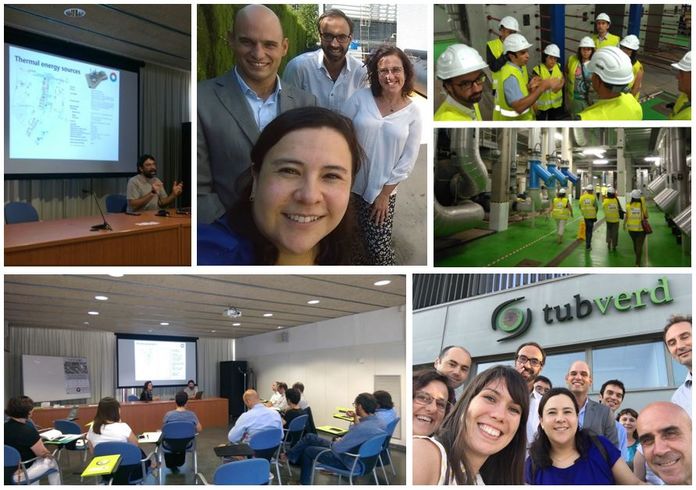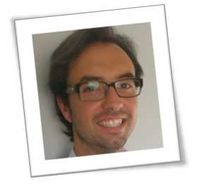THERMOS Twinning meetings e-diaries
THERMOS cities are dedicated towards the acceleration and optimization of low-carbon heating and cooling systems and the roll-out of the THERMOS energy planning tools. For that purpose THERMOS pilot cities hold peer-to-peer twinning meetings to provide guidance and share experience in the application of the THERMOS software.
Cities are keeping e-diares to capture their experience and share it with others.
Selecte here which experience to dive into first!
1st round of Twinning Meetings:
- Warsaw & Berlin. Two capitals connect on thermal planning
- Jelgava & Alba Iulia. A Tale of two smart cities
When Cascais met Granollers. Pioneering in district energy
2nd round of Twinning Meetings:
- Revisited: Alba Iulia & Jelgava. A Tale of two smart cities
- Revisited: Berlin & Warsaw. Connecting on thermal planning
Revisited -Warsaw & Berlin. Connecting on thermal planning (December 2019)
In late 2018, THERMOS pilot city Warsaw and the Polish National Energy Conservation Agency KAPE hosted the German Energy Agency (dena) as representatives of the City of Berlin for the 1st Twinning meeting to showcase Warsaw’s use of THERMOS in its Białołęka district.
In December 2019, dena invited partners from Warsaw back to showcase their progress in exploring the best options for new networks and heat network expansions in the Berlin-Kreuzberg and other quarters of the city. In the next years dena is striving to support replication across Germany as part of THERMOS and related urban energy transition initiatives.
Already during our first Twinning in Warsaw it was established that the framework conditions for adopting THERMOS in Berlin and Warsaw are very comparable, as the decarbonisation of heating is an essential element of both cities’ Climate and Energy Action Plans. For this 2nd twinning in Berlin we invited external, local stakeholders, such as Vattenfall, the Institute for Ecological Economy Research (IÖW), the Berlin Energy Agency as well as the Berlin Senate Department for Economics, Energy and Enterprises. This was essential for us, as in Berlin implementation mainly lies with grid operators, individual initiatives and the different borough administrations. Hence, for facilitating DHC planning with THERMOS in the city, it will be crucial to have all relevant local stakeholders on board.
From our one-day exchange we took several action points to follow up on in the coming months for the 16 new buildings selected for our test case in Kreuzberg. We also decided to continue with the selected case, although heat supply is already highly energy efficient given the applied passive house standards. However, with THERMOS we have the opportunity to assess new options for its supply by assessing the extension of the network to the neighbouring district’s old buildings.
As the preliminary work for the case study is completed, our focus will be on acquiring the actual heat demand data and use it for further improving the predictions by the tool. Particularly for special cases of buildings that cause deviations due to their insulation status or age of the buildings. The demand estimation function of the tool is of special interest for a wider adoption of the tool in Berlin, since demand data is often in the hands of private stakeholders. During discussions in the twinning meeting it became clear that we also need to continue making the model’s algorithm, data processing and demand estimation basis more transparent for external users to adopt the tool permanently. Once the model’s working assumptions had been clarified, we registered great interest by the present stakeholders in the tool, confirming its potential to revolutionise their current heating and cooling planning practices.
The meeting not only showed that the model’s heat consumption estimations for larger city districts are already very solid, but invited stakeholders confirmed its intuitive interface and great potential to make a difference in their daily work. We look forward to work in all the feedback and results from our case with THERMOS partners in the coming months.
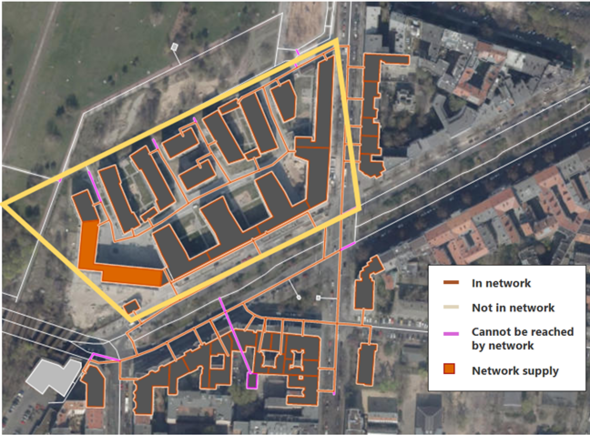
By Marta Kęsik, pilot city of Warsaw, Rita Ehrig, dena, Alexandra Pfohl, ICLEI Europe.
Revisited - Alba Iulia & Jelgava. A Tale of two smart cities (November 2019)
Pilot city Jelgava has vast experience with district energy and was one of the first cities to test the THERMOS tool. In September 2018, Alba Iulia was invited to attend the first twinning meeting in Latvia, to learn about the local district energy project planning with THERMOS.
Since then, THERMOS replication city Alba Iulia has singled out a test case for developing pre-feasibility studies for future heating systems. In November 2019, we invited our partners from Jelgava to Alba Iulia to exchange know-how and information on the identified projects and to reach our local energy targets and advancing smart city processes with THERMOS.
Alba Iulia has only recently finalised its Sustainable Energy and Climate Action Plan (SECAP) for 2030 with the target of reducing CO2 emissions by at least 40%. Together with ALEA (Alba Local Energy Agency), a THERMOS Ambassador and key energy stakeholder in the city, we hope to provide affordable, green energy in the future by rolling out energy efficient district heating and cooling systems (DHC) with THERMOS.
In contrast to Jelgava, Alba Iulia has seen a shift to individual heat supply systems since the 90’s. Despite being one of the most cost and energy efficient ways to deliver heating & cooling in densely populated areas, district networks have a rather bad reputation in Romania, due to old infrastructure and unreliability of supply in the past. Thus, one of the main challenges will be to increase acceptability, before reviving networks on a large scale. Three of the main challenges in Alba Iulia that will need to be addressed are:
- Municipal energy utilities are provided by private companies, with currently only around 30% of electrical energy coming from Renewables;
- Alba Iulia city hall currently doesn’t have a dedicated department for dealing with energy efficiency policies;
- The Municipality relies largely on external private partners for energy consumption data and communication with potential customers.
Based on the consultation with Jelgava, we decided to focus on buildings administrated directly by the Municipality and to look into additional funding and technical expertise for increasing the percentage of Renewables in the local energy mix. With THERMOS we now singled out five public, educational buildings. We will aim to connect to a house supplied by a boiler. The project will feed into our SECAP and possibly our future Integrated Urban Development and Smart City Strategies.
Our experience with THERMOS for test cases in both cities is that identifying and subsequently proposing possible solutions for different types of DHC systems to new clients was much faster. Our city planners found it to be much easier and significantly faster to assess in which directions to expand or build a network, and to investigate market potentials.
In the coming months, together with the THERMOS technical partners, the two cities will focus on optimising the interface and features of the software, and on further improving precision of data prediction by the software for cases in which energy demand data is missing.
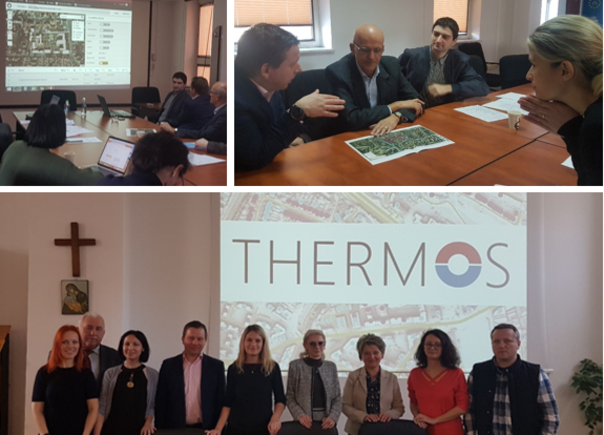
By Maria Elena Seemann, Ioana Baba replication city of Alba Iulia, Inga Kreicmane, pilot city of Jelgava, Alexandra Pfohl, ICLEI Europe
Warsaw & Berlin. Two capitals connect on thermal planning (Autumn 2018)
Katarzyna Kacpura, THERMOS pilot city Warsaw
Deputy Director of Infrastructure Department
The City of Warsaw and our partner KAPE (Krajowa Agencja Poszanowania Energii/KAPE – Polish National Energy Conservation Agency) were pleased to host dena, as representatives of the City of Berlin, for our first twinning meeting! We proudly dove into our THERMOS software test case, which focuses on the northern Białołęka district, one of the areas with the highest number of newly-built residential buildings and highest potential for development.
Here, our objective is twofold: to assess the feasibility, sustainability and profitability of connecting part of the Białołęka district to a new heating source – the ‘Czajka’ sewage treatment plant – and to assess the potential for expansion of the existing heating network. This district has the potential to play a key role in improving air quality through the reduction of low-stack emissions by replacing coal heat sources with more ecological alternatives – natural gas, RES and waste heat – and by increasing the number of buildings connected to the district heating and gas networks (many currently are not).
Together with our German guests, we discussed the utility of THERMOS to collect information and compare possible scenarios for the above situation. We did an appraisal of the tool interface, model workflow, and data categories, after which we looked at the replicability potential in Berlin. Discussions confirmed that it is important to develop not only a central district heating system, but also to think about the possibility of creating local systems fed by alternative heat sources. We agreed that presenting the economic benefits of creating such systems – creating business case for energy efficiency, as is possible with the THERMOS tool – can strengthen both Warsaw and Berlin’s energy work by being more persuasive for decision makers and more encouraging for users.
The most important objective for the next twinning meeting is to use the newest version of the THERMOS model with real demand values from Warsaw and Berlin. We look forward to meeting again in the winter to test the latest software version with real data and sharing the lessons learned from the solutions modelled!
Pia Dorfinger, THERMOS Replication city Berlin (representative partner)
Team Leader, Start-ups and Innovation, Renewable Energies and Mobility, dena
We as dena are participating in THERMOS twinnings on behalf of the replication city of Berlin. The city administration is, at the strategic level, interested in comparing the costs and benefits of having a small number of large heat distribution systems versus a larger amount of smaller, more local networks. Secondly, the city administration is interested in appraising options for new local (district) networks and using specific waste sources.
Berlin will use the THERMOS software in a “confirmation/reality check.” Real planning data coming from a heating network currently under construction and foreseen to supply heat to an entirely new residential neighbourhood, will be compared with the results of the THERMOS tool.
Like Warsaw, Berlin is looking at localised and local solutions, integrating renewable energy sources into heating networks. Energy stakeholders in our city are particularly interested in evaluating to what extent heating networks are needed in light of energy efficiency measures and building refurbishments. This was reflected in what we heard from our Polish counterparts and the THERMOS tool will contribute to this.
For dena, representing Berlin, it was also interesting to learn about Warsaw’s general energy planning and spatial planning measures. Since Berlin is currently working on its roadmap to achieve its energy and climate targets for 2050, it was useful to learn more about Warsaw’s processes and their limits. Another important aspect for Berlin, similar to Warsaw, are questions around such large cities’ “integrated approaches” to energy and infrastructure planning, including (e-)mobility, for example. Once it is fully up and running, the THERMOS will therefore be an important tool for both cities and their local partners to look at and evaluate integrated heating and electricity infrastructure planning.
At the second twinning visit, we look forward to assessing the robustness of the THERMOS software in the presence of our Warsaw colleagues, with respect to addressing the two sets of objectives of Berlin, and building on the experience of the pilot city.
Jelgava & Alba Iulia. A Tale of two smart cities (September 2018)
Inga Kreicmane, THERMOS pilot city Jelgava Director of the Zemgale regional energy agency (ZREA) 
Jelgava and the regional energy agency I lead got engaged with THERMOS to test out the energy planning software for the expansion of our existing district heating network and to further advance our efforts to become a ‘smart city’. In Jelgava we have vast experience with district networks, which already covers around 85% of the city’s total heat consumption. However, mobilizing the financial and human resources required to model and connect interested end-users to the existing network proves to be quite challenging at the moment.
With THERMOS, we can analyze decisive parameters for energy planning – like investment requirements, potential heat consumption, heat losses and payback timeframes for specific districts – from the convenience of our own desks! The software will allow us to plan in-house, and ultimately more cost and time efficiently. With our Romanian twinning city, we wanted to share our experience regarding management models and integration of heating and cooling mapping in existing energy models, stakeholder engagement and data usage.
With a visit to the local FORTUM biomass cogeneration station and a demonstration of the THERMOS tool, we hope to have supported our Alba Iulia colleagues who are looking to revive their district energy network. For our next meeting we are looking forward to applying the software in Alba Iulia and to deepen our exchange, and create synergies in energy planning and smart city processes.
Dan Hodos, THERMOS replication city Alba Iulia Urban Development Expert
Like many cities in Eastern Europe, we in Alba Iulia used to have an extensive district energy infrastructure, but in recent years it has been replaced by individual gas boilers. Our goal is to turn this trend around by reintroducing district energy. It was important for us to get involved in THERMOS, as we were looking for an application that would show us possible routes for new networks, while also taking into account user-specific pre-conditions from our previously existing routes.
For the twinning, we were especially interested in learning about public-private management models in Jelgava for operating the networks and supplying plants, how to develop city-wide heating and cooling maps and to explore what data we would need to use the THERMOS software. It became clear that with THERMOS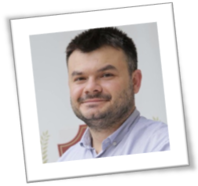 , we can significantly reduce the complexity of district energy planning for entire districts and individual houses alike. The cooperation between FORTUM and Jelgava is a very interesting engagement example for us if we want to ensure secure supply and reaching our clean energy objectives and Covenant of Mayors commitments.
, we can significantly reduce the complexity of district energy planning for entire districts and individual houses alike. The cooperation between FORTUM and Jelgava is a very interesting engagement example for us if we want to ensure secure supply and reaching our clean energy objectives and Covenant of Mayors commitments.
We took from the meeting that waste management and waste-to-energy options are important questions for both cities and that both we and our Latvian partners share the ambition to become smart cities. This first meeting makes us looking forward to continue our exchange.
When Cascais met Granollers (September 2018)
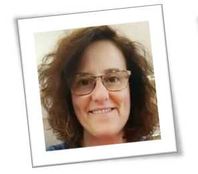
Marta Chillida Munguet, THERMOS pilot city Granollers Environmental Technician, Ajuntament de Granollers, Spain
As a THERMOS pilot city, Granollers is currently testing the THERMOS for the planning and implementation of a district heating network providing our largest industry complex – Congost - with low-carbon energy. Before the meeting with our replicator and twinning partners from Cascais, we knew they would like to benefit from our experience to supply new housing areas in Cascais with thermal heating and cooling themselves. Thus, we opted to organise several site visits to public and private collaboration system examples from district thermal energy practice in the Cataluña region to give our partners concrete impressions.
By outlining district energy network practices in Granollers, the meeting helped us to refine our own assessment of the potential for using the THERMOS software, while at the same time giving our Portuguese partners some solid numbers and estimations about requirements, costs and pre-conditions.
For the second meeting, we hope to get a better idea of the context, practices and challenges of managing thermal infrastructure in Portugal. E.g. about what processes, services, stakeholders and authorities are involved in DHC planning in Cascais and what opportunities and challenges will likely have to be expected.
João Dinis, THERMOS replication city Cascais
Project Manager, Empresa Municipal de Ambiente de Cascais, Portugal
Already the first twinning meeting proved to be very beneficial for fostering district thermal systems in Cascais and beyond. The examined case studies provided us with some necessary data and a good idea of what to expect and aim for, as there is not only no existing district heating networking in Cascais, but also few to no practical examples in Portugal to learn from so far.
We have seen the potential for DHC in both energy savings and environmental impact (reduction of emissions). It was great to see the economic impact and benefits for clients and suppliers as well. A win-win technology. During the meeting we identified that Cascais has the necessary structure to manage DHC infrastructure and the THERMOS software.
We are now in the position to better assess what information we will need to use the THERMOS software (e.g.: classification of buildings, infrastructure costs, data privacy) and what governance model to put in place to involve the clients and technical partners adequately.
Based on our exchange, we will now start to disseminate the tool among relevant stakeholders in the energy and acclimatization sector and amongst spatial planning professionals. For the coming months we hope that in using the software we will get a better picture about which areas are suited best.
We are looking forward to hosting Granollers for the second round, to share our case study locations with them and to acquire additional expert feedback taking into account the spatial characteristics of our city.
